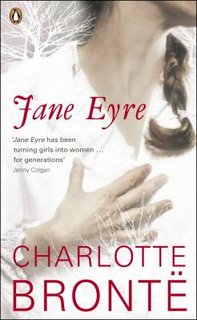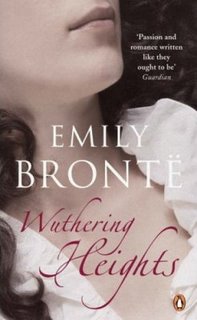The second episode was broadcast last night (and will be repeated a few times later this week, including immediately after Jane Eyre next Sunday night). It focused on the Romantic Hero.
In fact for 55 of the 60 minutes it focused on just four heroes. The usual suspects: F Darcy, E Rochester, H Heathcliff* and R Butler.
 While there was nothing wrong with what they said about any of them (except perhaps for poor Daisy Goodwin swanning around Atlanta in a Scarlett O'Hara dress, oh, and the cringe-making e-fit Mr Darcy bit) I couldn't see why the programme needed to spend so much time on just those four. Of course there was plenty of opportunity to show clips from the various film and television adaptations of Pride and Prejudice, Jane Eyre and Wuthering Heights, but this programme was supposed to be about romantic fiction: books, not films and television programmes. Goodwin even made the point that Austen gives virtually no physical description of Darcy, and part of his success must be the scope he gives readers to picture him however they like (the point of the e-fit segment). She then completely undermined her argument by tracking down Andrew Davies to talk about Colin Firth's wet shirt.
While there was nothing wrong with what they said about any of them (except perhaps for poor Daisy Goodwin swanning around Atlanta in a Scarlett O'Hara dress, oh, and the cringe-making e-fit Mr Darcy bit) I couldn't see why the programme needed to spend so much time on just those four. Of course there was plenty of opportunity to show clips from the various film and television adaptations of Pride and Prejudice, Jane Eyre and Wuthering Heights, but this programme was supposed to be about romantic fiction: books, not films and television programmes. Goodwin even made the point that Austen gives virtually no physical description of Darcy, and part of his success must be the scope he gives readers to picture him however they like (the point of the e-fit segment). She then completely undermined her argument by tracking down Andrew Davies to talk about Colin Firth's wet shirt.I cannot deny that I found Goodwin's views on Heathcliff absolutely spot on, but did we need all those clips, and our Daisy strolling out on the wiley, windy moors? Did we need so many writers gushing over Darcy and Rochester? For having spent all of those 55 minutes on analysing these four old warhorses, there was no time left, for, for instance, a discussion about how the romantic hero has (or has not) evolved since the days of Jane Austen and the Brontës (I have to confess to having little time for Margaret Mitchell, whose book, had it not been made into such a sumptuous film, would probably be long-forgotten by now).
 Given that she was talking to Jilly Cooper, Goodwin could have considered with her whether Rupert Campbell-Black was simply Darcy/Rochester/Heathcliff in modern dress, or something new. Talking to Maddie Rowe of Mills and Boon, Goodwin could have explored why, when Darcy/Rochester/Heathcliff are very English, Mills and Boon Modern heroes (the real Alpha males of the genre) are nowadays almost always foreign. Having talked to Sophie Kinsella and Marian Keyes for the first programme, they could have asked them how the chick-lit hero (or indeed the hero of romantic comedies of all sorts) gets away with not being an Alpha male, and what that says about readers' relationship with romantic comedy as opposed to straight romance - particularly given the "having an affair with the hero" concept that Katie Fforde talked about during the creative writing workshop that Goodwin attended.
Given that she was talking to Jilly Cooper, Goodwin could have considered with her whether Rupert Campbell-Black was simply Darcy/Rochester/Heathcliff in modern dress, or something new. Talking to Maddie Rowe of Mills and Boon, Goodwin could have explored why, when Darcy/Rochester/Heathcliff are very English, Mills and Boon Modern heroes (the real Alpha males of the genre) are nowadays almost always foreign. Having talked to Sophie Kinsella and Marian Keyes for the first programme, they could have asked them how the chick-lit hero (or indeed the hero of romantic comedies of all sorts) gets away with not being an Alpha male, and what that says about readers' relationship with romantic comedy as opposed to straight romance - particularly given the "having an affair with the hero" concept that Katie Fforde talked about during the creative writing workshop that Goodwin attended.All in all I came away feeling that this was a bit of a missed opportunity to explore the romantic hero of today, rather than just wallowing in the same old same old.
* "It was the name of a son who died in childhood, and it has served him ever since, both for Christian and surname." Wuthering Heights, Chapter IV.

3 comments:
I couldn't see it, but they picked heroes I don't like except Darcy. I never finished Wuthering Heights because of that abominable Heathcliff, and Butler spoiled some of Gone With the Wind for me. Rochester was sorta bearable but I could not stand Jane Eyre. I vaguely remember I didn't care for the heroine in WH, either.
I'm hopeless when it comes to romance, lol. Give me some battles any day. :)
I didn't see it--though I should have, because my editor was on it--but I agree, that a discussion of romantic heroes needs to go further and and look at more recent developments. Our ideas of both femininity and masculinity have changed so much since the 19th century.
To be picky, I don't think the hero of Wuthering Heights is Heathcliff Heathcliff. I think he's just Heathcliff, sometimes with a "Mr". His son is Linton Heathcliff, his wife Isabella Heathcliff, but he has only one name (unlike the two Catherines, who have one Christian and three surnames between them, in reverse order). This fact leads academics to all sorts of interesting speculation about identity and naming in the book, particularly linked with gender roles.
I agree the programme could have gone deeper into the subject of heroes, but at least it is a start: people are talking about romantic fiction and (for the most part) without sneering.
What we need now is to take it further.
Post a Comment